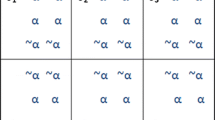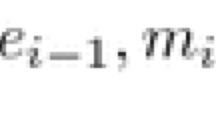Abstract
This paper presents a methodological approach to the management of symbolic preferences in integration with classical pure logical reasoning problems. We investigate two selection modes for choosing preferred sets of assumptions: democratism and elitism.
Principally we show how to manage the optimization of democratism preference criterion in the context of coherence restoration.
The use of symbolic structures for the preferences also makes possible the translation by formal duality of democratism preference-based coherence problems into elitism preference-based explanation problems.
Finally we insist on the computational aspects by considering the pragmatics of the integration problems and proposing constructive solutions.
ONERA-CERT participation to this work has been supported by the DRET-contract 89002.668.
Preview
Unable to display preview. Download preview PDF.
Similar content being viewed by others
References
K.J. Arrow: Social Choice and Individual Values. Yale University Press 1963.
F. Achard, V. Royer, C. Saurel: Management of preferences and coherence restoration. Journées nationales du PRC-IA, Plestin les Grèves, sept. 1991.
G. Brewka. Preferred sub-theories-An extended logical framework for default reasoning: Proc. IJCAI 1989, pp. 1043–1048.
C. Cayrol: Un modèle logique général pour le raisonnement révisable. Revue d'Intelligence Artificielle 6 (3), 255–284 (1992).
P. Chatalic, C. Froidevaux: Graded Logics: a framework for uncertain and defeasible knowledge. Proc. ISMIS 1991, Charlotte (NC).
C. Cayrol, V. Royer, C. Saurel: Management of Preferences in Assumption based Reasoning. Report CERT-IRIT n∘ 92-13-R, University Paul Sabatier, March 1992.
D. Dubois, J. Lang, H. Prade: Inconsistency in possibilistic knowledge bases-To live or not live with it. In: Zadeh, Kacprzyk (eds.): Fuzzy Logic for the Management of Uncertainty. Wiley 1991.
D. Dubois, H. Prade: Possibilistic logic, preferential models, non monotonicity and related issues. Proc. IJCAI 1991, pp. 419–424.
J. Doyle, M.P. Wellman: Impediments to Universal Preference-Based Default Theories. Proc. 1st Conf. on Principles of Knowledge Representation and Reasoning, Toronto, pp. 94–102, 1989.
H. Geffner: Conditional entailment: Closing the gap between defaults and conditionals. Preprints of Third International Workshop on Nonmonotonic Reasoning, South Lake Tahoe, CA, 1990.
V. Lifschitz: Circumscriptive theories: a logic-based framework for knowledge representation. Proc. AAAI 1987, pp. 364–368.
U. Junker, G. Brewka: Handling Partially Ordered Defaults in TMS. In: Kruse, Siegel (eds.): Proc. ECSQAU. Lecture Notes in Computer Science. Springer 1991, pp. 211–218.
T. Przymusinski: On the declarative semantics of stratified deductive databases. Proc. Foundations of Deductive Databases and Logic programming, Washington, 1986.
V. Royer: Le raisonnement révisable par l'expression de préférences: méthodes et outils formels. Technical Report Onera-Cert, dec. 1990.
C. Saurel: Applications de raisonnement révisable dans des applications d'automatique et de robotique: Logiques préférentielles et algorithmes de maintenance de vérité. Technical Report Onera-Cert, dec. 1990.
Y. Shoham: NonMonotonic Logics: Meaning and Utility. Proc. IJCAI 1987, pp. 388–393.
J. Wrzos-Kaminski, A. Wrzos-Kaminska: Explicit Ordering of Defaults in ATMS. Proc. ECAI 1990, pp. 714–719.
Author information
Authors and Affiliations
Editor information
Rights and permissions
Copyright information
© 1993 Springer-Verlag
About this paper
Cite this paper
Cayrol, C., Royer, V., Saurel, C. (1993). Management of preferences in assumption-based reasoning. In: Bouchon-Meunier, B., Valverde, L., Yager, R.R. (eds) IPMU '92—Advanced Methods in Artificial Intelligence. IPMU 1992. Lecture Notes in Computer Science, vol 682. Springer, Berlin, Heidelberg. https://doi.org/10.1007/3-540-56735-6_39
Download citation
DOI: https://doi.org/10.1007/3-540-56735-6_39
Published:
Publisher Name: Springer, Berlin, Heidelberg
Print ISBN: 978-3-540-56735-6
Online ISBN: 978-3-540-47643-6
eBook Packages: Springer Book Archive




